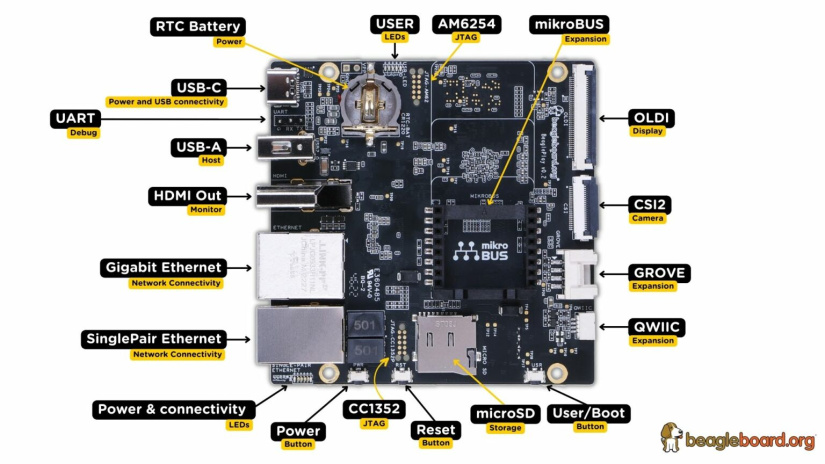Embedded World 2023: Exploring the BeaglePlay & BeagleConnect
BeagleBoard has been a well-known open hardware development platform for a long time, and it's an exciting time for them as they introduce two new products - the BeaglePlay and the BeagleConnect Freedom. We had the chance to sit down with BeagleBoard founder Jason Kridner at Embedded World 2023 to discuss what makes these two new boards so exciting and why open hardware is so important to BeagleBoard. We also got the chance to get up close with both new boards, along with seeing just a small selection of the hundreds of compatible mikroBUS Click add on boards.
The BeaglePlay is a Linux single-board computer that brings simplicity to development. It features a new chip from Texas Instruments, the AM625, a low-cost quad-core A53 running alongside 2GB of RAM. BeagleBoard has focused on making the developer experience easier by featuring a mikroBUS connector that can connect over a thousand different mikroBUS clipboards. The BeaglePlay also has Grove and Qwiic connectors, along with many connectivity options, including 2.4 and 5 GHz WiFi, single-pair ethernet, and sub-gigahertz wireless. The sub-gigahertz wireless is especially useful, as the BeagleConnect Freedom uses the same microcontroller as the BeaglePlay to create a wireless connection up to a kilometer away at a kilobit. This allows for data collection from a variety of mikroBUS sensors.

In terms of other I/O, the Play uses a USB-C connector for power and data, has a USB Type-A Host port, camera, and touch screen connectors along with a full-size HDMI out,
The BeagleConnect Freedom is a smaller devkit that looks a little like a walkie-talkie, with a range of onboard sensors and a battery management system. It has two mikroBUS ports that extend the reach of what you can do with the BeaglePlay. Click boards (which attach to the mikroBUS socket on both devkits) are an ecosystem that allows for adding any kind of I/O or sensor without any soldering. It is an open standard created by MikroElektronika, which makes most of the boards for it. The Click boards are MikroElektronika boards, but it's a freely licensable standard, and anyone can use the logo if they create a compliance solution. While Grove and Qwiic are excellent for what you can do with just two wires plus power, mikroBUS comes with a number of advantages. It's a very simple set of guidelines that have all the typical embedded buses you want: spy, UART, I2C, PWM, and Analog. Both boards are out now, and Mouser has store pages for the BeaglePlay and the BeagleConnect Freedom so you can get started with your long-range sub-gigahertz wireless projects straight away!














































Leave your feedback...